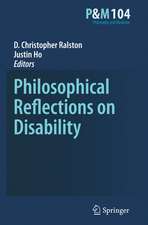Animal Welfare: Competing Conceptions And Their Ethical Implications
Autor Richard P. Haynesen Limba Engleză Paperback – 16 apr 2010
| Toate formatele și edițiile | Preț | Express |
|---|---|---|
| Paperback (2) | 381.98 lei 6-8 săpt. | |
| SPRINGER NETHERLANDS – 19 oct 2010 | 381.98 lei 6-8 săpt. | |
| SPRINGER NETHERLANDS – 16 apr 2010 | 381.98 lei 6-8 săpt. | |
| Hardback (1) | 389.49 lei 6-8 săpt. | |
| SPRINGER NETHERLANDS – 22 aug 2008 | 389.49 lei 6-8 săpt. |
Preț: 381.98 lei
Nou
Puncte Express: 573
Preț estimativ în valută:
73.11€ • 79.45$ • 61.46£
73.11€ • 79.45$ • 61.46£
Carte tipărită la comandă
Livrare economică 21 aprilie-05 mai
Preluare comenzi: 021 569.72.76
Specificații
ISBN-13: 9789048187874
ISBN-10: 9048187877
Pagini: 190
Ilustrații: XXV, 162 p.
Dimensiuni: 155 x 235 x 15 mm
Greutate: 0.27 kg
Ediția:2008
Editura: SPRINGER NETHERLANDS
Colecția Springer
Locul publicării:Dordrecht, Netherlands
ISBN-10: 9048187877
Pagini: 190
Ilustrații: XXV, 162 p.
Dimensiuni: 155 x 235 x 15 mm
Greutate: 0.27 kg
Ediția:2008
Editura: SPRINGER NETHERLANDS
Colecția Springer
Locul publicării:Dordrecht, Netherlands
Public țintă
ResearchCuprins
The Science of Laboratory Animal Care and Welfare.- The Roots for the Emerging Science of Animal Welfare in Great Britain.- The Historical Roots of the Science of Laboratory Animal Welfare in the US.- Laboratory Animal Welfare Issues in the US Legislative and Regulatory History.- Mandated Institutional Animal Care and Use Committees.- Do Regulators of Animal Welfare Need to Develop a Theory of Psychological Well-Being?.- Conclusion.- The Emergence of the Science of Food Animal Welfare Mandated by the Brambell Commission Report.- Rollin’s Theory of Animal Welfare and Its Ethical Implications.- Duncan and the Inclusion of Subjectivity.- Fraser on Animal Welfare, Science, and Ethics.- Appleby-Sandøe and the Human Welfare Model.- Nordenfelt and Nussbaum on Animal Welfare.- Conclusion to Part II.- Giving Animals What We Owe Them.- to Part III.- The Fair Deal Argument.- A General Theory of Our Moral Obligations to Nonhuman Animals.- Conclusion: Competing Conceptions of Animal Welfare.
Recenzii
From the reviews:
"Remarkably well-researched, philosophically reflective, and thought-provoking book … . The value of Haynes’s book lies in its superbly documented insistence that it is morally incumbent upon us to expropriate animal welfare from the narrow and self-serving definition widely disseminated by the animal science welfare community … . Richard Haynes has written a genuinely important book on the ethics of human/animal relations … ." (David Hoch, Journal of Agricultural and Environmental Ethics, Vol. 22, 2009)
“This valuable book serves two equally important purposes: it provides and intellectual history of the idea of ‘animal welfare’ and it also presents an ethical analysis of the uses and misuses of the term. … the book not only a complement and correction to the existing literature on human-animal relations but also an original and substantive addition to it.” (Anna Peterson, Agriculture and Human Values, Vol. 27, October, 2010)
"Remarkably well-researched, philosophically reflective, and thought-provoking book … . The value of Haynes’s book lies in its superbly documented insistence that it is morally incumbent upon us to expropriate animal welfare from the narrow and self-serving definition widely disseminated by the animal science welfare community … . Richard Haynes has written a genuinely important book on the ethics of human/animal relations … ." (David Hoch, Journal of Agricultural and Environmental Ethics, Vol. 22, 2009)
“This valuable book serves two equally important purposes: it provides and intellectual history of the idea of ‘animal welfare’ and it also presents an ethical analysis of the uses and misuses of the term. … the book not only a complement and correction to the existing literature on human-animal relations but also an original and substantive addition to it.” (Anna Peterson, Agriculture and Human Values, Vol. 27, October, 2010)
Textul de pe ultima copertă
Members of the “animal welfare science community”, which includes both scientists and philosophers, have illegitimately appropriated the concept of animal welfare by claiming to have given a scientific account of it that is more objectively valid than the more “sentimental” account given by animal liberationists. This strategy has been used to argue for merely limited reform in the use of animals. This strategy was initially employed as a way of “sympathetically” responding to the abolitionist claims of anti-vivisectionists, who objected to the use of animals in research. It was subsequently used by farm animal scientists.
The primarily reformist (as opposed to abolitionist) goals of this community make the false assumption that there are conditions under which animals may be raised and slaughtered for food or used as models in scientific research that are ethically acceptable. The tendency of the animal welfare science community is to accept this assumption as their framework of inquiry, and thus to discount certain practices as harmful to the interests of the animals that they affect. For example, animal welfare is conceptualized is such a way that death does not count as harmful to the interests of animal, nor prolonged life a benefit.
The primarily reformist (as opposed to abolitionist) goals of this community make the false assumption that there are conditions under which animals may be raised and slaughtered for food or used as models in scientific research that are ethically acceptable. The tendency of the animal welfare science community is to accept this assumption as their framework of inquiry, and thus to discount certain practices as harmful to the interests of the animals that they affect. For example, animal welfare is conceptualized is such a way that death does not count as harmful to the interests of animal, nor prolonged life a benefit.
Caracteristici
Challenges the accepted distinction between animal welfarists and animal liberationists Provides a philosophically sophisticated account of the concept of welfare applied to “animal welfare” Provides a unique and hitherto undocumented history of the animal care and animal welfare movement


